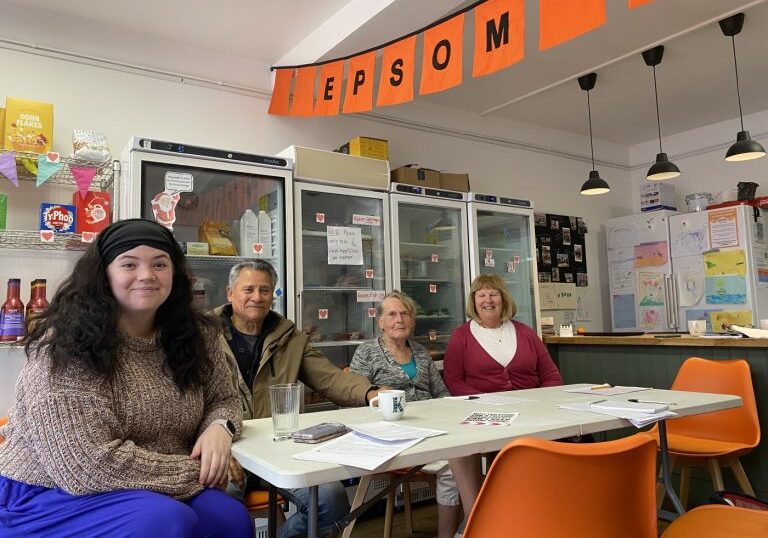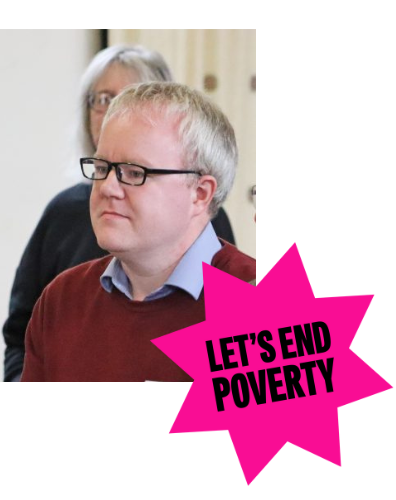Neighbourhood Voices
The UK needs to get serious about ending poverty. And to do that, we need to have meaningful conversations including a wide range of voices.
In the lead up to this year’s General Election, we want to help make that happen, and show that every voice matters.
Hear from communities who've taken part so far
Dreams & Realities in Camden
11/06/24
This Neighbourhood Voices conversation comes from Epsom, just on the Surrey side of the Surrey-London boundary
Read moreCould you host a conversation?
We’re inviting you to host a conversation in your community, and to share your neighbourhood voice via Let’s End Poverty.
Could you bring a group of people together to talk about their hopes, dreams and challenges and the action they would like to see at the General Election, and share their voices with others?
We want community groups or churches in low-income areas to hold a Neighbourhood Voices conversation, enabling new voices to be heard loud and clear.
- What is happening in your community that makes you proud or gives you hope?
- What are the successes that deserve more support?
- What are your dreams and aspirations for you and your neighbourhood?
- And what is getting in the way of progress?
- What systems need to be dismantled or done differently, so people can flourish?
We’ve put together a toolkit to help you bring people together and host an imaginative conversations about where we want to see change.
Once you’ve hosted your conversation, we will work with you to publish blogs, videos or audio clips on the Let’s End Poverty website, so the voices of your neighbourhood are heard more widely in this election year, and so we can challenge all aspiring politicians to truly listen.
Let’s End Poverty stands for a future where poverty no longer keeps anyone down. Do you stand for that future too? Then let’s talk!

Why host a Neighbourhood Voices conversation?
Gavin Aitchison, Media & Storytelling coordinator at Church Action on Poverty, says:
“Far too often, we hear the same voices again and again. Too rarely do we hear from the general public, particularly in low-income neighbourhoods. This conversation approach enabled dozens of people to speak up ahead of the 2017 General Election. It can work again this year.”
How To Guide
There’s no perfect way to host a conversation – different things will work for different communities. Here are here are some practical tips, based on what we have learnt.
Who to invite
- Aim for 8 to 12 people. A few more or less is still workable, but if you have too many people then nobody gets to talk in much depth.
- Our aim is to share perspectives and opinion from people whose voice isn’t usually heard. Consider if there are particular groups or people in your community who would benefit from an opportunity to speak from their first hand experience of poverty.
- It’s best if participants already know and trust each other. Encourage an existing group to meet, rather than inviting lots of individuals who don’t know each other.
- Dedicate space and time to this, so people are concentrating on this discussion. Pop the kettle on and have some biscuits to hand, and sit somewhere comfortable.
- Make sure that people are aware the conversation will be shared as part of Let’s End Poverty before they participate, so that they feel comfortable sharing and being recorded (more information on this below).
How to begin the conversation
- The aim of the conversation is to invite people to talk about the issues in their community that matter to them, and the changes they would like to see. Introduce this at the start of conversation, to help frame the discussion.
- The conversation should be about issues, not political parties. This leads to deeper and more positive discussion, and it also makes it easier for us to publish blogs and videos without breaching charity election rules.
- Make sure that everyone feels able to speak and share their opinion – there’s no right or wrong answers or perspectives.
- Encourage the conversation by asking some questions, to help people raise the topics they want to talk about. For example…
What is happening in your community that makes you proud or gives you hope?
What is the best thing about life here? What could make it better?
What are your dreams and aspirations for you and your neighbourhood? And what is getting in the way of progress?
We know that some changes take longer than others – what would you like to be different in the next year or so, and what could be different in the next decade?
What do you want this community to be like when today’s children grow up?
If you were a candidate in this election, what would you prioritise?
What would you really love to hear candidates talking about during the election campaign?
How to record what’s shared
- In order to share and amplify the voices from your neighbourhood, you need to capture some of the conversation you’ve had. This could be in writing, video or audio.
- You might not want to share the whole conversation – but quotes of perspectives or questions participants have shared will help capture what was discussed.
- It’s good to have detail of what people have said. The more specific the quotes the better. If you have someone who can take notes that’s great – or ask if people are happy for the conversation to be recorded.
- If you can take some pictures or video of the group in conversation, this will help personalise the message you want to get across.
- Download the consent forms we have provided (click here), and ask participants to sign. We need to make sure everyone is happy with comments, pictures and maybe videos being used afterwards. If participants would like to be anonymous, this option can be chosen on the form.
How to share your voice
- Fill out the form below to let us know that you’re hosting a conversation, and share your details with us.
- Email the content you’d like to share to hello@letsendpoverty.co.uk.
- If you have ideas about how we share your neighbourhood’s voice, please share these with us. Then, we will work with you to put together a blog or video sharing your content on the Let’s End Poverty website.
- Sharing your conversations with local, regional and national media is a great way to have your voice heard. We can work with you to do this most effectively.
Some questions to get you started
Here are some ideas for questions that might help get the conversation going? You don’t need to use them all, but do try to ask some questions from each of the sections. We’d love people who don’t know your community to get an idea of its best qualities, its challenges, people’s political priorities in this Election year, and people’s long-term hopes.
Scene setting: Questions about the community at its best
- What are the best things about living here? What happens in your community that makes you proud or gives you hope?
- What are your strengths in this community? What do you do really well here?
- What are the local successes that deserve more support?
- What do people who live here know, that other people don’t know?
- What are some great moments or funny things that have happened here?
- What brings people together here? What are the shared celebrations or practices?
- What’s the commonly told story of your community? What do people often talk about? What moments or events have shaped it?…. And what do you want the story of this place to be?
- What are the treasured places and spaces here? What is precious to you? Where do you feel most at home or at ease? Most inspired? Most supported?
- What are the small things that are happening that make a difference?
- Who are the characters in this community?
Looking at the challenges?
- Are there things or systems that are holding the community and its people back?
- Are there things you used to have here, which have been lost and which should be restored?
- What systems need to be dismantled or done differently, so people can flourish?
- What would you like to see removed from the community – or what’s missing that needs adding?
Looking to the election
- Have you voted before? Do you think you’ll vote this time?
- What is your experience of politics? Speaking to councillors or MPs, campaigning etc.
- When have you felt heard? When have you felt ignored?
- Whose voices aren’t even here today? What would other people say?
- What would you really love to hear candidates talking about during the campaign?
- If you were a candidate in this election, what would you prioritise?
Longer-term hopes and aspirations
- What are your dreams and aspirations for you and your neighbourhood?…. What do you want this community to be like when today’s children grow up?
- What would you like to change within the next year or so… and what within the next decade?
- What’s the gap between your long-term dream, and your current reality? What or who could help bridge that gap?
Register your Neighbourhood Voices Conversation here
If you let us know about your conversation in advance, we might be able to come and support you in recording and sharing your voice. Fill out the form below and we’ll be in touch.
The Let’s End Poverty movement will use your email address to keep you updated about the movement, events and opportunities to get involved. Your data will be held and processed by The Methodist Church, on behalf of the Let’s End Poverty movement. We reserve the right to share the data with third parties who will process the data on our behalf for the purpose of using your email address to keep you updated about the movement, events and opportunities to get involved. Click here to read our privacy notice.